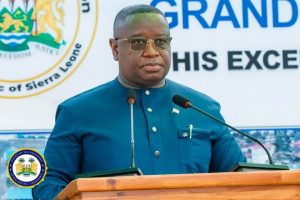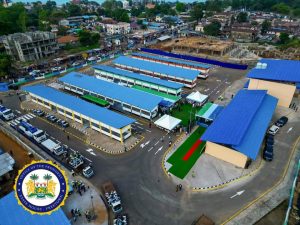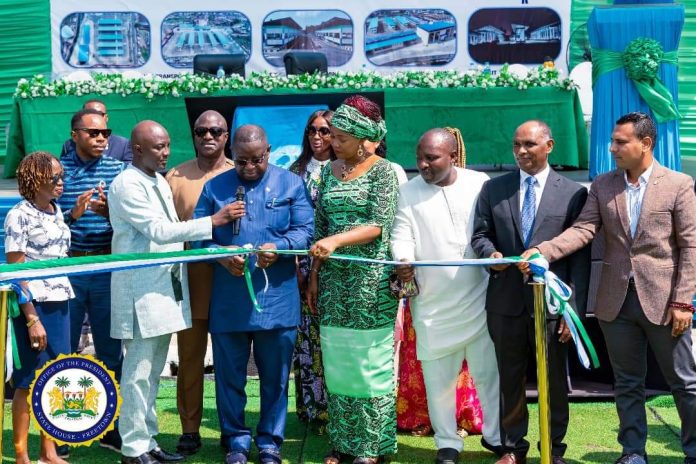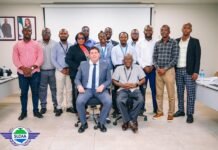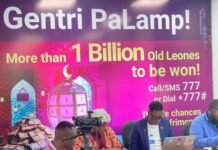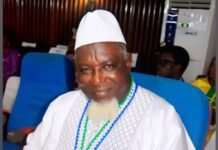By Alvin Lansana Kargbo
President Dr. Julius Maada Bio, on Wednesday, November 27, 2024, officially commissioned the Transit Transport Terminal and Traffic Signal System as part of the $52 million Integrated and Resilient Urban Mobility Project (IRUMP). This groundbreaking initiative, funded by the Government of Sierra Leone and the World Bank, aims to modernize urban transport, enhance public safety and accelerate economic growth.
During the commissioning ceremony, President Bio highlighted the transformational nature of the project, which aligns with his Government’s Big Five Game Changer Agenda. The President stated that the newly inaugurated facilities would significantly improve connectivity, streamline transportation and enhance daily commutes and business operations.
“This marks a pivotal step in our commitment to economic growth and public safety. The Transit Transport Terminal will centralize transportation services, reducing delays and congestion, and facilitating the efficient movement of people and goods,” President Bio emphasized.
The Integrated and Resilient Urban Mobility Project features three key components:
- Modernization of Public Transport Services under the Waka Fine initiative.
- Resilient Infrastructure Development, including the terminal and traffic signals.
- Institutional Capacity Building for effective transport management.
The state-of-the-art Transit Transport Terminal, designed for inclusivity and accessibility, incorporates features to accommodate persons with disabilities and promote sustainability. Complementing this is a modern traffic signal system aimed at regulating traffic flow, reducing congestion and improving road safety across Freetown.
President Bio also reminded the public of his administration’s earlier introduction of 50 high-capacity buses, which now transport over 26,000 commuters daily. Combined with the new terminal, these efforts are set to address longstanding urban mobility challenges, alleviate congestion and bolster Sierra Leone’s socioeconomic development.
The Minister of Transport and Aviation, Alhaji Fanday Turay, praised President Bio’s visionary leadership in fostering development through strategic public-private collaborations. He elaborated on the project’s components, clarifying that the $52 million budget covers multiple aspects, from infrastructure development to the procurement of transport assets.
He commended the contributions of local professionals in tasks such as setting up traffic systems and constructing roads. He also acknowledged the role of the Sierra Leone Public Transportation Agency (SLPTA) in regulating the informal transport sector and Metro Transport Company in managing the new terminal.
World Bank Urban Transport Specialist, Adams Diehi, commended the project, stating, “This terminal and traffic signal system are tangible outcomes of a shared vision for inclusive and sustainable development. They will drastically improve urban mobility and the quality of life for Sierra Leoneans.”
Leticia S. Senessie, a private sector representative from Metro Transport Company, echoed similar sentiments. She praised the Government’s efforts to create an enabling environment for businesses while modernizing infrastructure to uplift the nation’s socioeconomic landscape.
In his keynote address, President Bio articulated his administration’s vision for a more efficient and sustainable transportation system, describing the project as a cornerstone of Sierra Leone’s modernization efforts.
“Our decisions about transportation directly impact daily lives, determining the ease of movement and access to opportunities. This terminal and traffic signal system represent progress, efficiency and inclusivity. They embody our resolve to transform challenges into opportunities for growth,” the President stated.
President Bio further underscored the broader implications of the project, noting that the terminal would serve as a centralized hub for public and private transportation, improving logistics and enabling citizens to spend less time in traffic and more on productive activities.
Acknowledging the collaborative efforts of development partners, local authorities, and the Ministry of Transport and Aviation, President Bio expressed gratitude for their contributions to the project’s success. He urged all stakeholders, including commuters and transport operators, to embrace the opportunities provided by the new infrastructure and ensure its sustainability.
“The success of this infrastructure lies in our hands. Let us take ownership, maintain it responsibly, and maximize its benefits for generations to come,” the President encouraged.
The commissioning of the Transit Transport Terminal and Traffic Signal System represents a significant leap forward in Sierra Leone’s journey toward modern, inclusive urban mobility solutions. As President Bio officially declared the facilities operational, he expressed hope for a future where Sierra Leone continues to be a beacon of progress and prosperity.
“Let us remain united in purpose as we work to build a brighter future for Sierra Leone. May these facilities serve our nation well,” President Bio concluded.
The event reaffirmed the collective commitment of the Government, international partners and private sector stakeholders to driving sustainable development and improving the quality of life for all Sierra Leoneans.
